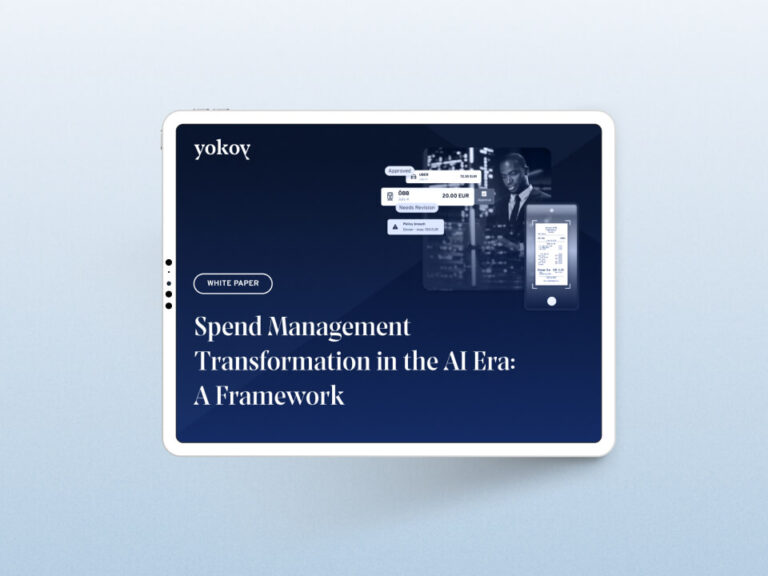Finance 4.0 is a term that refers to the latest phase of evolution in the finance industry, driven by technological advancements and digital transformation.
In this era, traditional financial practices are being revolutionized to provide more efficient and personalized services to customers, while also addressing the challenges and opportunities brought about by emerging technologies.
This article will explore the concept of Finance 4.0, its key components, the role of technology, the benefits of embracing it, and the challenges in implementing it.
If you want to learn more, feel free to download our white paper on this topic.
Understanding the concept of Finance 4.0
Finance 4.0 is not just a buzzword but a fundamental shift in how financial services are delivered and consumed.
To truly understand Finance 4.0, we need to trace its evolution from earlier versions.
- Finance 1.0 was the traditional banking system that relied heavily on manual processes and face-to-face interactions.
- Finance 2.0 introduced online banking and digital transactions, making it more convenient for customers to access financial services.
- Finance 3.0 brought about automation and data analytics, allowing for better decision-making and risk assessment.
- Now, Finance 4.0 takes these advancements further by integrating technologies like blockchain, artificial intelligence, and big data analytics into the financial landscape.
The evolution of Finance: From 1.0 to 4.0
Finance has come a long way since its early beginnings.
Finance 4.0 represents a paradigm shift in the financial industry. It is not just about digitizing existing processes but reimagining the entire financial ecosystem. With Finance 4.0, financial institutions are embracing cutting-edge technologies to enhance customer experiences, improve operational efficiency, and drive innovation.
One of the key drivers of Finance 4.0 is blockchain technology. Blockchain, a decentralized and immutable ledger, is revolutionizing the way financial transactions are conducted and recorded. Its transparent and secure nature ensures trust and eliminates the need for intermediaries.
With blockchain, financial transactions can be executed faster, more securely, and at a lower cost. Additionally, it enables the creation of smart contracts, which automate and enforce the terms of agreements without the need for intermediaries.
Another crucial component of Finance 4.0 is artificial intelligence (AI). AI is increasingly being used in finance to automate processes, enhance decision-making, and provide personalized financial services. AI-powered chatbots, for example, can interact with customers, answer their queries, and provide instant support.
Machine learning algorithms can analyze vast amounts of data to detect patterns, identify anomalies, and make predictions. This enables financial institutions to offer tailored recommendations and personalized services to their customers, ultimately improving customer satisfaction and loyalty.
Furthermore, big data analytics plays a vital role in Finance 4.0. The ability to collect and analyze vast amounts of data allows financial institutions to gain deep insights into customer behavior, market trends, and risk assessment.
By leveraging big data analytics, financial institutions can offer personalized services, such as customized investment portfolios and targeted marketing campaigns. They can also make data-driven decisions, mitigating risks and identifying new business opportunities. The power of big data analytics combined with AI enables financial institutions to stay ahead of the competition and provide superior services to their customers.
Check out our newsletter
Don't miss out
Join 12’000+ finance professionals and get the latest insights on spend management and the transformation of finance directly in your inbox.
The role of technology in Finance 4.0
Technology plays a crucial role in shaping the landscape of Finance 4.0. It not only drives innovation but also enables financial institutions to deliver more efficient and customized services. Let’s explore some key technologies that are transforming the finance industry.
Blockchain and Finance 4.0
Blockchain technology, originally developed for cryptocurrencies like Bitcoin, is now revolutionizing finance. Its decentralized and tamper-proof nature provides a secure and transparent platform for conducting financial transactions. Blockchain can streamline processes, reduce costs, and enhance trust and security in financial transactions.
Blockchain technology has the potential to transform various aspects of the finance industry. For example, it can revolutionize the way we handle cross-border payments. Currently, cross-border transactions can take days to complete due to the involvement of multiple intermediaries. However, with blockchain, these transactions can be completed in a matter of minutes, with reduced fees and increased transparency.
Moreover, blockchain can also address the issue of financial inclusion. In many parts of the world, individuals lack access to traditional banking services. Blockchain-based solutions can provide them with secure and affordable financial services, allowing them to participate in the global economy.
Artificial intelligence and autonomous finance
Artificial intelligence has vast applications in finance, from fraud detection to predictive analytics.
Machine learning algorithms can analyze vast amounts of data, identify patterns, and provide valuable insights for financial institutions. AI-powered chatbots and virtual assistants are also transforming customer interactions and providing personalized financial guidance.
One area where AI is making a significant impact is in fraud detection. Traditional methods of detecting fraudulent activities often rely on predefined rules and patterns, which can be easily bypassed by sophisticated fraudsters.
However, AI algorithms can continuously learn and adapt to new fraud patterns, making it more difficult for criminals to deceive the system.
AI is also revolutionizing the way financial institutions assess creditworthiness. Traditional credit scoring models rely on limited data points, such as credit history and income.
However, AI algorithms can analyze a wide range of data, including social media activity and online behavior, to assess an individual’s creditworthiness more accurately. This allows financial institutions to provide loans to individuals who may have been overlooked by traditional credit scoring methods.
White paper
Finance 4.0: How the Fourth Wave Is Reshaping the Financial Centre
What is Finance 4.0 and what does it mean for CFOs? How is Finance 4.0 different from it predecessors? Discover it all on our white paper.

The impact of big data on financial processes
With the advent of Finance 4.0, financial institutions have access to massive amounts of data. Big data analytics enables them to make data-driven decisions, assess risks more accurately, and identify new market opportunities. It also allows for personalized financial services tailored to individual customer needs, fostering greater customer satisfaction.
Big data analytics has transformed risk management in the finance industry. By analyzing large volumes of data in real-time, financial institutions can identify potential risks and take proactive measures to mitigate them. This not only helps prevent financial losses but also enhances the stability of the entire financial system.
Furthermore, big data analytics allows financial institutions to gain a deeper understanding of their customers. By analyzing customer data, such as transaction history and browsing behavior, financial institutions can offer personalized product recommendations and targeted marketing campaigns. This not only improves customer satisfaction but also increases customer loyalty and retention.
In conclusion, technology is playing a transformative role in shaping Finance 4.0. Blockchain, artificial intelligence, and big data analytics are revolutionizing the finance industry, enabling financial institutions to deliver more efficient, secure, and personalized services. As technology continues to advance, we can expect further innovations that will reshape the future of finance.
The benefits of embracing Finance 4.0
Embracing Finance 4.0 offers numerous benefits for both financial institutions and customers. Let’s explore some of the key advantages.
- Enhanced financial efficiency and transparency: Finance 4.0 enables financial institutions to automate processes, reduce manual errors, and streamline operations. This results in increased efficiency, reduced costs, and faster service delivery. Moreover, the transparency offered by blockchain technology improves trust and accountability in financial transactions.
- Personalized financial services: In the era of Finance 4.0, financial services can be tailored to individual customer needs. Advanced analytics and AI-powered algorithms allow for personalized recommendations and financial planning. This helps customers make better financial decisions and achieve their goals.
- Improved risk management: Finance 4.0 equips financial institutions with powerful tools for risk assessment and management. Big data analytics can identify potential risks in real-time, enabling proactive risk mitigation strategies. AI algorithms can analyze patterns to detect fraud or suspicious activities and reduce financial risks.
Challenges and solutions in implementing Finance 4.0
While Finance 4.0 brings immense opportunities, it also presents challenges that need to be addressed for successful implementation. Let’s explore some of these challenges and potential solutions.
Overcoming technological hurdles
The adoption of advanced technologies like blockchain and artificial intelligence requires technical expertise and infrastructure. Financial institutions need to invest in skilled professionals and robust IT systems to support the implementation of Finance 4.0. Collaborations with technology partners and fintech startups can help overcome technological hurdles.
Addressing security and privacy concerns
As financial systems become more digitized, security and privacy become critical concerns. Financial institutions must invest in robust cybersecurity measures to protect sensitive customer data and secure transactions. Compliance with data protection regulations and industry standards is essential to build trust with customers.
Navigating regulatory compliance in Finance 4.0
The integration of advanced technologies in finance brings new regulatory challenges.
Financial institutions must navigate complex regulatory frameworks to ensure compliance while leveraging the benefits of Finance 4.0. Collaboration between regulators, financial institutions, and technology providers can help establish balanced and effective regulations.
In conclusion, Finance 4.0 represents a significant shift in the finance industry, driven by technology and digital transformation. It offers improved efficiency, personalized services, and enhanced risk management.
However, successful implementation requires overcoming technological hurdles, addressing security concerns, and navigating regulatory compliance.
Financial institutions that embrace Finance 4.0 stand to benefit from its transformative power, ensuring they stay competitive in the evolving financial landscape.
White paper
Spend Management Transformation in the AI Era: A Framework
In the era of AI-driven digital transformation, traditional finance processes are becoming obsolete. As companies grapple with increasing complexities and rising competition, they must recognise the transformative potential of artificial intelligence to stay ahead of the curve.
